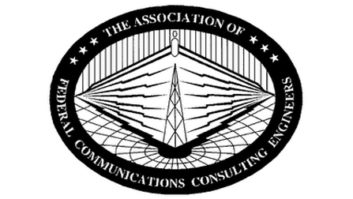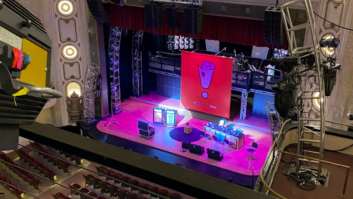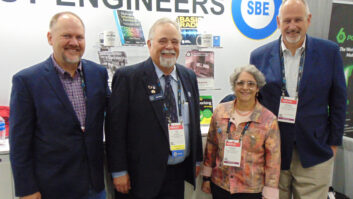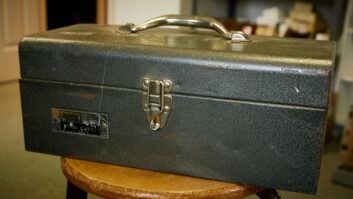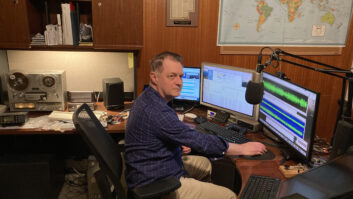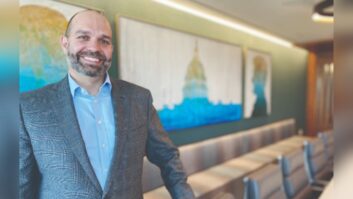When the FCC’s Rodolfo (“Rudy”) Bonacci learned he was the 2017 recipient of the E. Noel Luddy Award from the Association of Federal Communications Consulting Engineers, he wanted to make one thing clear: “This isn’t a lifetime achievement award!”

AFCCE Luddy Award Winner Rudy Bonacci
At just 45 years old, the 23-year veteran of the FCC is one of the younger winners of the award, which honors meritorious service to the telecommunications industry, and he wants to be clear: He’s looking forward to many more years of service at the commission, where he serves as assistant division chief, engineering in the Audio Division.
In an RWEE interview, Bonacci admitted that he didn’t necessarily expect to make the FCC his lifetime career when he joined the agency in 1994 as a newly-minted electrical engineering graduate from the University of Maryland. He’d been working part-time in a completely different branch of government — at the U.S. Department of Agriculture’s instrumentation and sensing lab in Beltsville, Md. — and envisioned a career in business. “I was dreaming of being a CEO.”
Along the way, though, Bonacci went to a career fair before graduation, where the FCC was recruiting for trainees. At the time, many new commission hires were sent to Norfolk, Va. for training, where they would choose the divisions that most interested them before being sent to headquarters in Washington.
“But alas, I didn’t make it,” Bonacci recalls. “Instead, I got a call in July after I graduated. They said they didn’t want me to go to Norfolk. They wanted me to go straight to Washington, to the Audio Division.”
Upon arriving at the commission, Bonacci was immediately assigned to start learning about the FM rules (“We were the FM Branch at the time, Audio Services Division”), which at first meant cracking the books to read up on the rules, since his boss, James Bradshaw, was on vacation when Bonacci came to work.
At the time, there were more engineers on staff — “I think we’re down to 15, 16 engineers total, when we used to have 10 guys just doing FM when I started” — and yet, Bonacci recalls, applications took much longer to make their way through the FCC process.
“Back in 1994–95, we used to have four-month processing goals for minor change applications, and now we’re down to 30 days,” he recalls. “We used to need 24 hours just to make changes to an authorization because it would go to a printer in the basement and we had to wait to pick it up.”
Bonacci takes pride in many of the ways in which his staff has streamlined its processes even as new challenges have continually been thrown their way.
“One of the big flips was low-power FM becoming so prominent, and then the translators,” he said.
“We used to have a separate auxiliary services branch — Tom English used to be the translator team. And then when Jim Bradshaw took over translators, it became one big thing. The prominence of translators was something we couldn’t have envisioned.”
Bonacci’s tenure at the Audio Division included the big shift from open FM applications to auctions. “That first auction was big, 200, 250 stations, and we tried to turn them around quickly. There was a lot of excitement,” he recalls. “But as the years have gone by, we don’t see as many big-time bids,” now that most of the prime allocations have been filled.
That maturation of the FM band has meant that work on full-power stations has slowed down over the years.
“We’ve had three retirees in a row,” he notes. “I used to supervise seven folks and now I’m down to four, so in terms of people doing FM work, it’s going to be less.”
LOOSENING UP
What’s a typical day for Bonacci? “My work involves day-to-day processing and reviewing what people submit to me. Nowadays it’s a lot of phone calls and emails, helping people figure out what’s a rule-compliant application, and then there’s all the side stuff, working on a new (LMS) database and trying to fix the old (CDBS) one,” he says.
That, as it turns out, is a big reason why AFCCE honored Bonacci — an honor he accepted not only for himself but on behalf of his team.
“We work together, we still do. Nobody’s on an island by themselves,” he says. And across the Audio Division there’s been a focus on becoming more available to talk with consulting engineers and lawyers.
“We used to be pretty strict,” he recalls, “letter-writers only, nervous about what was said in calls. Over the years we’ve tried to become more helpful. It helps us in the long run because we get more applications we can process to completion, we can send out fewer deficiency letters and we can be more efficient in our processing.”
Bonacci credits much of that improvement to the consulting and engineering community that works with the FCC, as well.
“We help them so they can help us,” he says. “So we don’t see a lot of unusual waiver requests and things like that, that have an uphill battle to get granted. I guess we don’t see so many applications with basic errors. On FM, they usually have an attorney and a consulting engineer working with them. We’ve been doing this for a while, and they’ve been doing this for a while, so they know what will be granted and what won’t. It works for everybody. They get what they want.”
The exception? “Normally the problems arise when people don’t use the consultants, when they try to do it on their own,” Bonacci says.
ON THEIR TOES
Looking ahead to his next few years at the FCC, Bonacci sees some big changes coming.
There’s the logistical challenge of making his second big physical move, this time from the FCC’s current offices at the Portals in southwest Washington to a new home in northeast D.C. Administratively, Bonacci’s boss, Audio Division Chief Peter Doyle, has retired from full-time work, succeeded by Al Shuldiner, whose selection was announced in January.
“In terms of what I do, I get asked questions about upcoming auction windows,” Bonacci says. “People are always asking about the next noncommercial educational FM windows — the last one was in 2010, and before that was 2007.”
Other changes Bonacci says could come to his plate in the years to come include new policies for dealing with complaints about interference from FM translators, an issue NAB has been lobbying on.
There’s also the transition away from the aging CDBS database to an audio version of the LMS database that TV licensees now use. “We have a goal of Oct. 1,” Bonacci says, “but I don’t know if they’re going to implement things along the way. CDBS has been around for a while and I know the consultants kind of like it and the attorneys do too, but there are some elements that are getting out of date.”
And who knows what else may come down the pike for those of us who deal with the Audio Division on a regular basis?
“We always tell the consultants we keep you on your toes,” Bonacci says. “I’m not sure what’s next but we’ll be ready to go. There’s less of us here, but we manage to keep everything moving.”
Scott Fybush is a long-time contributor to Radio World.





